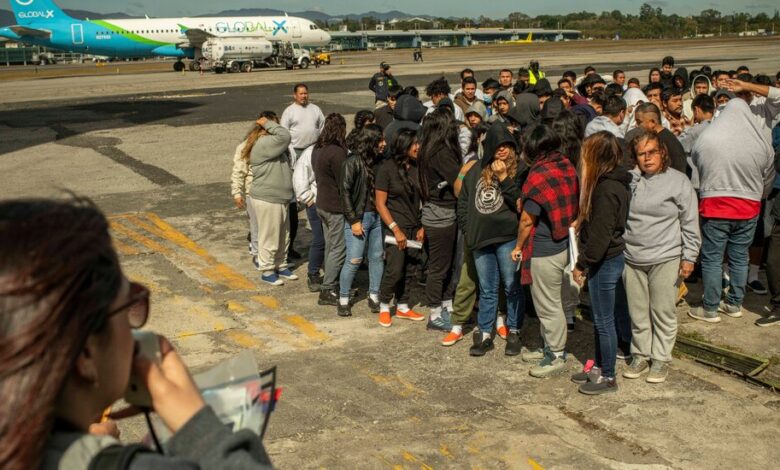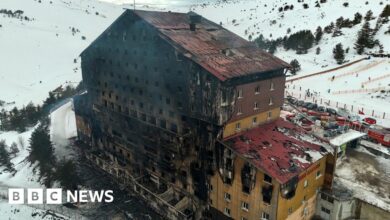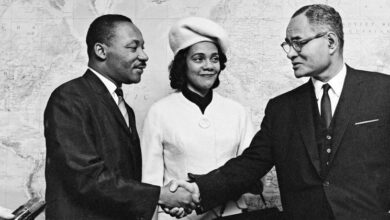How Guatemala plans to resettle planeloads of people deported from the United States

Recently, Carlos Navarro was eating takeout outside a restaurant in Virginia when immigration officers detained him and said there was an order to remove him from the country.
Mr. Navarro, 32, said he had never had any encounters with the law, adding that he worked at poultry plants.
“Absolutely nothing.”
Last week, he returned to Guatemala for the first time in 11 years, calling his wife in the United States from a deportee reception center in the capital, Guatemala City.
Mr. Navarro’s experience could be a preview of the kind of rapid deportations that are coming under President Trump to communities across America where there are many such people. 14 million illegal immigrants.
The administration, which has promised the largest deportations in US history, is reportedly starting to carry out them. Tuesday. In his inauguration speech on Monday, Mr. Trump promised to “begin the process of returning millions and millions of criminal aliens to where they came from.”
Mr. Navarro’s situation offers a glimpse of what mass deportations could mean in Latin American countries at the other end of the deportation line.
Officials there are preparing to receive a large influx of their citizens, although many governments say they already have cannot meet with the incoming administration about their deportation efforts.
Guatemala, a small, impoverished country ravaged by a brutal civil war, has a significant undocumented population in the United States. About 675,000 undocumented Guatemalans lived in the country in 2022, according to the Pew Research Center.
That makes it one of the largest countries of origin for illegal immigrants in the United States, after Mexico, India and El Salvador, and a laboratory on how mass deportations can change life outside the United States as well.
Last year, Guatemala received about seven deportation flights a week from the United States, equivalent to about 1,000 people, according to immigration officials. The government has told US officials it can handle up to 20 such flights per week, or about 2,500 people, officials said.
At the same time, the Guatemalan government is developing a plan – which President Bernardo Arévalo called “Returning Home” — to assure Guatemalans facing deportation that they can expect help from consulates in the United States — and, in the event of detention and deportation — a solemn welcome”.
“We know they are worried,” said Carlos Ramiro Martínez, the foreign minister. “They are living in absolute fear, and as a government, we can’t just say, ‘Look, we’re scared for you too.’ We have to do something.”
Guatemala’s plan, shared at a meeting of the region’s foreign ministers in Mexico City last week, goes beyond immediate concerns shared by many governments in the region – such as how to provide accommodation or food for deportees on their first night.
It also addresses how to reintegrate deported Guatemalans back into society.
The plan focuses on linking deportees to work and using their language and work skills, also aiming to provide mental health support for those facing with the trauma of deportation.
In practical terms, that means that when deportees step off the plane, government officials interview them extensively to get a detailed picture of the returnees’ the support they need and the type of work they can do.
Experts say Guatemala’s plan appears to reflect the Trump administration’s tacit expectation that Latin American governments not only accept deported citizens but also work to prevent them from returning to the United States.
Historically, many people sent back to their homeland have turned back and tried to return, “even under extreme circumstances,” said Felipe González Morales, who served as United Nations Special Rapporteur on human rights of migrants, said.
According to the US Department of Homeland Security, about 40% of deportations in 2020 involved people who had been previously deported and re-entered the country.
Mr. Martínez, Guatemala’s foreign minister, said in an interview that this dynamic for many years has been “basically a revolving door.”
Mr. Trump aims to change that.
Karoline Leavitt, a spokeswoman for Trump’s transition, said in an email: “As the world watches President Trump and his administration deport illegal criminals en masse from communities Americans return to their country”. come to America unless you intend to do so immediately, otherwise you will be sent home.”
The number of illegal crossings at the US border has dropped significantly, with about 46,000 people attempting to cross the border in November, according to the US government, the lowest monthly number under the US government. Biden administration.
The Trump administration is expected to put pressure on governments in Latin America to continue supporting the crackdown on migrants.
But Guatemala’s plan to reintegrate deportees is more than just a way to show Trump that Guatemala is cooperating, according to Anita Isaacs, an expert. Guatemala expert who created the blueprint for the plan.
“If you can find a way to integrate and exploit their skills, the opportunities for Guatemala are huge,” Ms. Isaacs said of deportees.
So far, she said, deportees getting off planes in Guatemala City have mostly received some basics, like new identification, hygiene supplies and trips to shelters or shelters. main bus station.
Instead, she suggested, Guatemala could view its newly returned citizens as an economic asset, including in its tourism sector.
As an example, she points to the case of hundreds of Guatemalans deported after a 2008 ICE raid on a meatpacking plant in Iowa, who continued to Become a volcano guide.
However, major challenges remain in encouraging deportees to stay in their home countries.
Alfredo Danilo Rivera, Guatemala’s migration director, said the forces that caused them to leave in the first place still exist: poverty and lack of jobs, harsh weather made worse by climate change, threat of gangs and organized crime.
Then there is the lure of the United States, where not only are there more jobs, but workers are paid in dollars.
“If we are going to talk about why people migrate, we also have to talk about the fact that they settled there and many succeeded,” Mr. Rivera said.
Father Francisco Pellizzari, director of Casa del Migrante, the main shelter for deportees in Guatemala City, said deportees also feel greater pressure to come to the United States than migrants do. first time.
They often owe smugglers thousands of dollars, and in rural Guatemala, poor people often give up their homes or land as collateral for loans to pay smugglers, which makes them essentially become homeless if evicted.
“They can’t go back anymore,” Father Pellizzari said.
Tougher measures imposed by the Biden administration at the border have also prompted smugglers, aware of the increased risk of deportation, to supply migrants, according to Father Pellizzari and others. three chances to enter the United States for the price of one try. .
José Manuel Jochola, 18, who was deported to Guatemala last week after being arrested for illegally crossing the border into Texas, said he has three months to use his remaining opportunities. “I will try again,” he said, although he will wait to see what Mr. Trump does.
The desire to return to the United States after deportation is especially strong among people with family there.
Mr. Navarro, who was recently deported from Virginia, said he was not discouraged by Mr. Trump’s repression. “I had to come back, for my son, for my wife,” he said.
A woman on the flight deporting Mr. Navarro, Neida Vásquez Esquivel, 20, said it was her fourth time being deported while trying to contact her parents in New Jersey. She said another attempt is not out of the realm of possibility.
But some deportees say the most attractive thing about staying in Guatemala is that now the alternative is no longer a good one.
After José Moreno, 26, was deported last week following a drunk driving accident, he decided not to return to Boston, where he had lived for a decade, because of the dangers of crossing the border and The new president’s attitude toward immigrants.
Instead, he said, he will use his English to offer guided tours of Petén, an area in Guatemala with picturesque lakes and Mayan ruins, where His family owns a small hotel.
“My parents are here, I have everything here,” he said. “Why did I come back?”
Jody Garcia Contributing reports from Guatemala City, and Miriam Jordan from Los Angeles.




